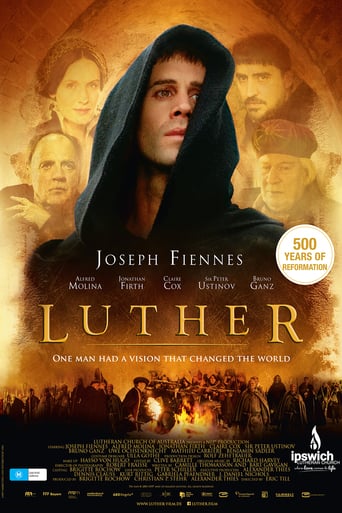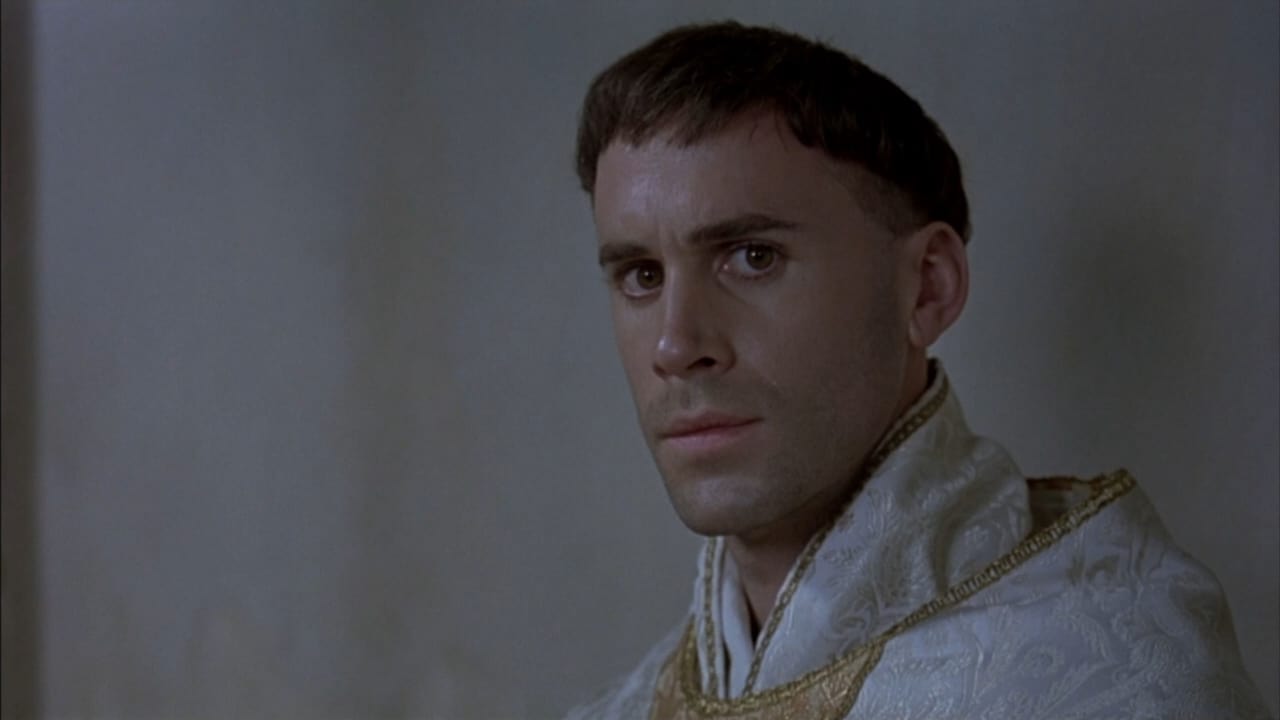SnoopyStyle
Martin Luther (Joseph Fiennes) is a doubting monk in 1507 Erfurt. He is angered by indulgences after a 2 week trip to Rome. He is sent to Wittenberg to study. He starts preaching against profiting from fake relics and the selling of indulgences. The church is raising funds to build St. Peter's Basilica. Father John Tetzel (Alfred Molina) is a traveling monk selling the new indulgences. Luther's frustration boils over and he nails "The Ninety-Five Theses on the Power and Efficacy of Indulgences" on the doors of his church. It's the start of the Protestant Reformation as his declaration puts him at odds with powerful forces, most importantly the Pope.I am not a theologian or a history expert. I don't know how much of the real story is retained and how much is simplified. I also take no sides in the battle. I feel for any Catholic who takes offense to the portrayal of the papacy. All of that is beyond the scope of this review. Joseph Fiennes is great with a few moments of overwrought acting. As a movie, it's compelling for the most part. The ending does lack a certain excitement. It ends at a perfectly good spot. The problem is that nailing the Theses is such a climax. The rest of the movie isn't quite as iconic.
jotix100
The life of Martin Luther, examined in this film, presents a man that started out his life by being a devout catholic. He even became an Agustinian monk, following his desire to be a better man. His faith was tested as he went to Rome. There, Martin experienced a world in which there was corruption and the men that called themselves followers of the doctrine, did not hesitate to break the precepts that were the basis of their religion. That experience, set Luther on the road that led to his eventual break with the church which he vowed to serve.In attending the university, Luther became aware of other way of thinking. Having seen first hand the way Rome conducted business, as the ambitious Pope Leo X, the ruler of the church wanted to build, what would later become, St. Peter's basilica, as a monument to his reign, to be financed by the selling of special indulgences, a sort of panacea that would benefit the ones buying them.Luther's rebellion came about when he started questioning things that up to that point, no one had dared to ask. Thus, he was deemed a heretic because he wanted to simplify things and worst of all, he decided to translate from the Greek the sacred scriptures that up to that time was only the domain of an inner group of Roman higher ups."Luther" is not a great film. It plays like a documentary by stating highlights in the life of Martin Luther. The film, directed by Eric Till, and written by Bart Gavigan and Camille Thomasson, is based loosely on the play by John Osborne. Of course, this is a re-imagination of a piece of history. How accurate it is, we have no idea. This is the kind of international co-production where the cast includes the basic English actors in the main roles, but there are different accents, depending on the nationality of the actor.Joseph Fiennes in the title role shows an inspired Luther. Others in the large cast include the excellent Bruno Ganz, Alfred Molina, Sir Peter Ustinov making his last appearance in a theatrical movie, and others. The film was splendidly photographed by Robert Fraisse, whose camera takes us to some breathtaking locales that span from Germany, to the Czech Republic and Italy. Our only objection was the Richard Harvey music score that has a way to interfere with the action.
bkoganbing
Exactly fifty years earlier Martin Luther got himself an autobiographical film that starred Niall McGinniss and got great critical acclaim. With better production values, color, and an impeccably cast group of players this story of the founder of one of the sects of Protestantism is destined to be a classic. In the review I did of the earlier film I noted that Martin Luther was one of many founders of Protestantism. His Lutheran church became the majority faith of northern Germany, the low countries and of Scandinavia. Other folks like John Calvin in Switzerland, John Knox in Scotland, and even Henry VIII in England all can claim some credit for the Protestant Reformation. I think Luther's legacy in the political sphere may be a bit more unassailable. That other German, Johannes Von Guttenberg, may have invented the printing press and used to print a Bible, but Luther had the Bible translated in his native tongue of German. That book was a declaration of political as well as spiritual independence from Rome.As the previous film had to observe the Code, this version of Luther took us into young Martin's spiritual journey and what might have repelled him from the Catholic faith when he first went to Rome to study. The Papacy was at its lowest ebb at that time, it was a prize to be bargained for among the rich Italian families like the Borgias and the Medicis. Salvation was for sale, a contribution to the church could buy your way to a good afterlife. My favorite scene in the film is the young priest Luther in a sermon talking about all the relatives he bought or is planning to buy from the devil in hell. Luther also disdained the idea of a celibate clergy. In that one he certainly was ahead of his times. My own feeling is that part of the reason the Catholic Church today insists on the celibate priesthood is that they don't want to appear to be giving into one of Luther's main tenets.Joseph Fiennes makes a passionate Luther, a man willing to risk all for the sake of his new found faith. Which is an unshakable belief that faith alone insures salvation, that no human intercession by priest or Pope is necessary and that it follows that the Word of God is not something spoon fed to people by a clergy reading it from an ancient language that they alone know.Luther was not the first religious reformer, but what kept him from being burned at the stake like others was the protection of the Duke of Saxony played here by Peter Ustinov. Luther turned out to be Ustinov's final theatrical film. Playing the cultured and politically attuned Duke, Ustinov goes out with one of his best big screen performances.The less attractive aspects of Luther's character are left out of the film, his misogyny, his sexism, his raging anti-Semitism. As he got older, Luther suffered from a variety of health issues that made him a nasty tempered fellow. His later writings certainly reflect that.Our film ends with the Holy Roman Emperor Charles V having to deal with a whole gang of new Protestant states in the German portion of his realm in 1530. This was due to Luther and as I said before, Luther's legacy may be more political than spiritual.Luther is not only good entertainment, it's very good history and that's an unbeatable combination.
imaselfproclaimedwannabe
Its historical accuracy (and I know what I'm talking about I am highly interested in church history) coupled with surprisingly good acting makes this film rise above many others I have seen. I could not have expected such quality from a film of it's production values (in fact I didn't). Also It does fairly well with not being overly cruel to the Catholics. It portrays them fairly with out being unrealistic (I was concerned it would just be a huge Catholic bashing fest when I went in). As for direction I found it pleasantly exciting, not Spielberg by any means but the film was made in and extremely interesting manner. Allow me to elaborate, the film is generally cut into very short scenes and switches rapidly (accept for scene's of special significance for witch it takes more time obviously). This style gives the film a well earned since of pace that make it far more exciting than any film I have seen in this genre. It is a must see!!


 AD
AD




